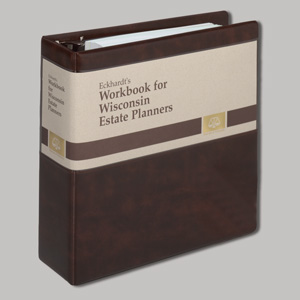
Sept. 7, 2022 – Planning is an important task for Wisconsin’s population, which, according to projections from the U.S. Census Bureau, will include 1.5 million residents age 65 and older by 2040. When a person does not have an estate plan, end-of-life legal worries and the delays they often cause add an extra burden for family members in an already stressful time.
An aging population means that more people will need lawyers to help them plan for their family’s needs and goals. Reaching those goals and maintaining them over time require knowledge as well as experience.
“The attorney’s task is to actively ferret out family facts, needs, and goals to assist the client in designing a comprehensive estate plan,” writes Judith G. McMullen, professor of law at Marquette University Law School and a coauthor of
Eckhardt’s Workbook for Wisconsin Estate Planners from State Bar of Wisconsin PINNACLE®.
There is more to estate planning than drafting a simple will. Estate planning is an art, where lawyers must take into account the overall situation of their clients. “Estate planning involves an initial determination of whether a will is appropriate at all,” writes McMullen. “When it is appropriate, it must often be used in combination with other planning techniques.”
These techniques include researching and understanding family dynamics, and how such dynamics affect the decision of who to appoint in a fiduciary capacity and how assets should effectively be distributed. “The estate plan should be both comprehensive and practical,” McMullen writes.
Estate planning “is not a static process; a client’s estate plan should evolve as a client’s life evolves and as the law changes,” McMullen notes.
In
Eckhardt’s Workbook for Wisconsin Estate Planners, McMullen and her coauthors provide an overview of estate planning in Wisconsin. They discuss matters related to estate planning, such as powers of attorney for finances and property, powers of attorney for health care, and marital property agreements. They also provide a system of forms and checklists for the entire process.
One aspect of estate planning is establishing a testamentary trust as a means to transfer assets to children, parents, and others, upon the client’s death. Such a trust is advisable “when reasons exist to not give the beneficiary unrestricted control over transferred property,” writes Caitlyn Sikorski, author of the chapter “Drafting a Will with Trust Provisions” and shareholder in the Trusts and Estates Practice of Reinhart Boerner Van Deuren, s.c.
Other reasons for a testamentary trust include planning for income and estate tax purposes and protecting assets from a beneficiary’s creditors. “In testamentary planning for the client’s children and other minors, the family situation will determine when and how trust assets are divided among the beneficiaries,” Sikorski writes. A “full and frank discussion” is suggested when clients wish to treat their beneficiary children differently from one another.
More on Referenced PINNACLE Book

Eckhardt’s Workbook for Wisconsin Estate Planners is available both in
print and
online via Books UnBound, the State Bar’s interactive online library.
“Excellent reference for anyone practicing in Estate Planning. This has long been the gold standard for handling estates and still is.” - Karen R. on
Eckhardt’s Workbook for Wisconsin Estate Planner.
Check out the Table of Contents.
The print book costs $313.20 for members and $391.50 for nonmembers. For more information, or to place an order, visit the WisBar
Marketplace or call the State Bar at (800) 728-7788 or (608) 257-3838.
